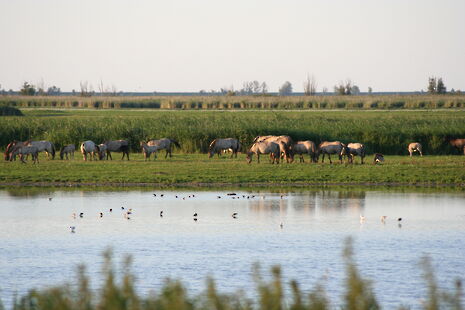Making conservation work
In conversation with William Sutherland, Miriam Rothschild Professor of Conservation Biology

Humans have been changing their surrounding environments since they came into existence 6 million years ago; in fact, it is one of the defining traits of our species. Yet the scale at which these changes are occurring has been increasing at an exponential rate in recent decades, having widespread and potentially long-lasting impacts on biodiversity the world over. I spoke with William Sutherland, Miriam Rothschild Professor of Conservation Biology, to discuss the major challenges in conservation and how these can be tackled, especially in the face of the major political shake-ups of recent years.
Biodiversity is the “basis of life on the planet”, of pragmatic importance given the dependency of “food, pollinators, resources” on it, as well as of aesthetic importance: “it makes a lot of difference to people.” Yet conservation faces considerable challenges. Habitat loss, where land use is changed for the short-term benefit of humans, such as for farming or agriculture, is a big issue, including “the loss of tropical forests, the loss of wetlands, loss of natural areas. Globally, it’s the most important problem.” Further, pollution and climate change are also great concerns, changing environments on a global scale. Humans co-exist with a diverse set of flora and fauna, and considering our earth-wide dominion, we have been the cause of major invasions by these organisms. “Many of our aquatic bodies have been overtaken by invasive plants. Especially on islands, invasive rats and cats are eating much of the native species: for example, the lighthouse keeper’s cat – called Tibbles – ate all the Stephen Island’s wren so it is now extinct. There’s a paper that came out yesterday showing that the areas where there’s the most threatened vertebrates are the areas populated by the most invasive mammals: those two seem to come together.”
“There are a lot of success stories and I think sometimes we become too pessimistic”
Professor William Sutherland
Conservation science, however, should not be observed as a story of doom and gloom, suggests Sutherland, as “there are a lot of success stories and I think sometimes we become too pessimistic.” He points to local achievements: “in Cambridgeshire you can see red kites. They are a conservation success stories due to a reintroduction programme. Out of the David Attenborough windows we regularly see buzzards and I once saw a raven out of the window here: they both spread because of a lack of persecution.” Indeed, many of the conservation challenges of the past have been “largely solved.” These include the “exploitation of predators, habitat management’s got a lot better, we used to massively overfish populations around the North Sea.” Another is water pollution in rivers, which is a transformation Sutherland has seen in his own lifetime. “I was brought up in Sheffield around the River Don, it was too polluted for any fish to live in. That’s no longer the case: our water bodies have become a lot less polluted.” These successes should be both celebrated and act as a paradigm for further work, says Sutherland. “We need to take the same approach of doing the right science and then applying it in order to solve continuing problems such as declines of agricultural species, woodland conservation, climate change and the spread of tree diseases.”
One new idea that has become both popular and controversial in recent years is the concept of “rewilding,” the process of reintroducing animals that once existed in an area but are now locally extinct as a method of land use. Sutherland points to the example of Oostvaardersplassen in the Netherlands, an area once used as industrial land, but given floods and a recession, sustaining an interventionist approach to conservation became economically unsustainable. “So they decided to sort of leave it alone but introduce Heck cattle and Konik ponies and red deer. And you go there and it’s like what it must have been like Pleistocene: great herds of animals wandering around; it looks stunning and it’s a reasonably effective way of managing this huge block of land.” This is an idea that Sutherland thinks is “a romantic idea but it’s certainly not a solution for everything.” In Cambridgeshire for example, such a scheme would often not work effectively because it’s a county of “many small sites with special diversity that you have to keep in a particular state to maintain their particular species.” On a large scale, rewinding has the potential to work as “species will find an early successional stage patch because of the occasional flood or storm or grazing.” Leaving small areas alone will often lead to a loss in early successional stage habitats, which home “most of the species we care about.”
“Cambridge is quite heavily involved in that discussion … Michael Gove is giving the right noises”
Professor William Sutherland
Leaving the European Union, suggests Sutherland, has both benefits and costs for conservation science. The EU has “done a lot of good,” particularly in the way that it has encouraged international collaboration: “Becoming isolated is exactly the wrong way that you want to go - I want to live in a more connected society” Yet “there are some opportunities. The common fisheries policy was terrible but has improved, while the common agricultural policy spent a huge amount of money o the environment but not very well … There is a lot of talk within government about ways of managing land that in a less expensive and more beneficial way.” Indeed, Sutherland is optimistic about the actualisation of these talks. “Cambridge is quite heavily involved in that discussion … A number of us have been discussing with those making the policies. Michael Gove is giving the right noises. Perhaps he could make a real difference.”
The situation in the USA, with the rise of Trump, is for Sutherland, generating a much more “chilly environment.” “There are immense concerns about the attitude towards science and knowledge, and that is worrying and depressing. I’m looking for the good side there…” The USA are leaders in climate change research and “yet some of the representatives of government bodies are not allowed to talk at climate change conferences.” He points to an event held at the Environmental Protection Agency headquarters enabling making coal extraction easier: “that was making a very clear statement about direction.”
Doing science is all well and good but it’s important to ensure that findings seed change, especially in the case of conservation science which is very much application-driven. This, however, is harder than it sounds. Sutherland spoke about the work his group has been doing, “we have a website called Conservation Evidence that summarises global evidence and makes it available to practitioners and policymakers.” Whilst, with the likes of Google, information has become more openly accessible, Sutherland feels it is often insufficiently comprehensive. “People are just doing little bits all over the place: it’s a bit haphazard… There’s something to be said for having comprehensive and understandable but where there’s a stamp of authority. There are medical sites that you can go and read a popular explanation for a range of problems. And you really need the same for conservation, where you know that people have searched the evidence and summarized the conclusions.”
Even with information available in an accessible format, some policymakers and practitioners suggest Sutherland exhibit “‘evidence complacency’ which is the tendency for people to think they needn’t know about the evidence, that their knowledge is sufficient.” He alludes to the example of building a bat bridge over the A11, aimed to minimise collisions between bats and lorries. “When they were built, I think there had been 17 other location but they hadn’t been tested and when they had it was shown they didn’t make a difference. It’s a worry that people are constructing these without having done the right testing and research beforehand.”
Conservation science has shown considerable success over the past decades, both in terms of collecting evidence and in translating it into policy. Still, there are considerable number of challenges that have yet to be solved, and given the recent political upheavals, some are pessimistic about our future
 Comment / The (Dys)functions of student politics at Cambridge19 January 2026
Comment / The (Dys)functions of student politics at Cambridge19 January 2026 News / Local business in trademark battle with Uni over use of ‘Cambridge’17 January 2026
News / Local business in trademark battle with Uni over use of ‘Cambridge’17 January 2026 Arts / Exploring Cambridge’s modernist architecture20 January 2026
Arts / Exploring Cambridge’s modernist architecture20 January 2026 Features / Exploring Cambridge’s past, present, and future18 January 2026
Features / Exploring Cambridge’s past, present, and future18 January 2026 News / Your Party protesters rally against US action in Venezuela19 January 2026
News / Your Party protesters rally against US action in Venezuela19 January 2026








